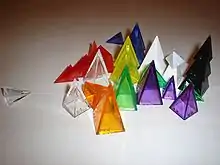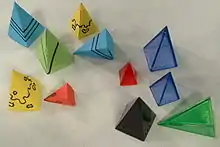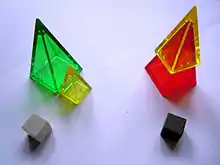Icehouse pieces
Icehouse pieces, or Icehouse Pyramids,[1] Treehouse pieces, Treehouse Pyramids[1] and officially Looney Pyramids, are nestable and stackable pyramid-shaped gaming pieces and a game system. The game system was invented by Andrew Looney and John Cooper in 1987, originally for use in the game of Icehouse.[2]
 Various Icehouse pieces | |
| Other name(s) |
|
|---|---|
| Manufacturer(s) | Grand Prix International |
| Designer(s) | John Cooper Andrew Looney |
| Publisher(s) | Looney Labs |
| Publication date | 1989 |
| Years active | 1987-present |
| Genre(s) | Game system |
| Website | icehousegames |
History
Andrew Looney in 1987 penned a sci-fi short story,[3] "The Empty City", that included a game called Icehouse, an ancient Martian game.[4] Readers of the short story requested to learn how to play the game. Thus actual rules were invented for Icehouse by Andrew Looney, Kristin Wunderlich (then future wife of Looney) and John Cooper, then plastic pyramid pieces were made to play the game.[3][4] The first commercially available set were solid non-stackable pyramids released in 1989 with only 100 sets made.[4] The pieces were made from resin in his apartment, which upset the landlord.[5] After several years, Looney shut down Icehouse Games, Inc. and soon started another gaming company, Looney Laboratories, in 1996.[3][6]
Additional games beyond Icehouse were created including Martian Chess, Zendo, and Homeworlds.[2] Looney then created the IceTowers game which used stacking pyramids leading to a change in the pyramid pieces' specification for stacking. The four games were released as a part of Icehouse: The Martian Chess Set, which was the first Icehouse pyramid system release by Looney Labs.[4] In 2001, Icehouse: The Martian Chess Set won the Origins Award for Best Abstract Board Game of 2000.[7] Icehouse was recognized as a game system in the game design textbook Rules of Play by Katue Salen and Eric Zimmerman.[4]
By June 21, 2002, Icehouse pieces were being sold in tubes containing a stash, or 15 pyramids of a single color, with nine colors available. Labs then released the book Playing With Pyramids, which contained a dozen games by the Looneys, Cooper, Kory Heath and Jacob Davenport.[8]
In 2004, the Zendo boxed set won Best Abstract Board Game of 2003,[9] In 2005 the set won the Mensa Select Game Award.[10] While in 2007, Treehouse won the Origins Award for Best Board Game of 2006.[11]
Looney Labs relaunched the Icehouse pieces as "Looney Pyramids" with new packaging with its IceDice set in June 2011[12] followed by Pink Hijinks in December 2012.[13] By 2013, the IcehouseGames.org website listed 400 games playable with icehouse pyramids.[2]
Original prototype under the name of Pyramid Throwdown in 2015, Pyramid Arcade was launched as a Kickstarter campaign on April 5, 2016.[14] The new boxed pyramid set was funded in under 12 hours. Racking up $150 thousand total, the set shipped to supporters in fall 2016.[1] Looney Labs put their Pyramid Quartet, Nomids, Ice Duo, Martian Chess and Homeworlds, together up on Kickstarter in February 2020, which was funded in three hours.[15]
Description

The pieces are four-sided pyramids that can nest and stack with pipping from 1 to 3 at the base. A group of three pyramids, one of each size, is called a "trio." Each "stash" or set of Icehouse pieces consists of five trios, or fifteen pyramids (variously called pieces, pyramids, or minions) of the same color and five of each three sizes:[4] five large 3-point pyramids (called "queens" in some games), five medium 2-point pyramids (sometimes called "drones"), and five small 1-point pyramids (or "pawns"). The stacked and nested feature is not used in the original Icehouse game, but is taken advantage of in some of the other Icehouse-based games listed below.[4]
Icehouse pieces were, for many years, sold as tubes containing one stash of durable crystal-look plastic pieces[2] in one of ten available colors (though cyan was only available through their promotional program or as part of the Ice Towers set). There was also a less expensive starter set called Origami Icehouse (later called Paper Icehouse), made of cardstock in four colors, which one punched out and folded into the pyramid shapes. In 2006, Looney Labs began selling Icehouse pieces as Treehouse sets, which are multicolored sets of 15 pyramids: five colors, each color having one each of the three sizes. Looney Labs has also sold boxed sets for Zendo and IceTowers; the latter contained cyan pieces. The Icehouse website also has instructions for making your own pieces. Looney Labs has licensed Crystal Caste to make regulation-sized Icehouse pieces out of semiprecious stone.[2] Beginning with its Looney Pyramids relaunch set, IceDice, the sets are packaged in pyramid shaped nylon zipper bag[12] until Pyramid Arcade.
Releases
| Set | pieces | games | released[16] |
|---|---|---|---|
IceHouse Games | |||
| Icehouse (The Original Black Box) | standard color stash | Icehouse | 1989 |
| Paper Icehouse ("Origami" Icehouse) | 1991 | ||
| Neon stash | |||
| Xyloid Icehouse | wood standard color stash | 1992 | |
Looney Labs stack-able | |||
| The Martian Chess Set (MCS) | 2 standard color stash in plastic box | Martian Chess, IceTowers, IceTraders & Zarcana[4] Origins Award for Best Abstract Board Game of 2000[7] | 1999 |
| Black Ice expansion | black and clear pyramids and a Martian chessboard bandana in hemp drawstring bag | None, coupon for future rule book (3HOUSE) | 2000 |
| Giant Cardboard Pyramids | 2001 | ||
| Icehouse Pieces monochrome stash tubes | one color stash | none | |
| Playing with Pyramids booklet (PwP) | none | IceTowers, Thin Ice, Zendo, Martian Backgammon, Volcano, Martian Chess, RAMbots, Pikemen, Zagami, Homeworlds, Gnostica, and the original Icehouse | |
| Zendo boxed set | 2 standard color stashes, 60 glass stones (green, white, black) | Zendo (w/16 starter rule cards) & ICE-7 other games reference cards | 2003 |
| IceTowers boxed set | 2 alternate colors stashes & The Empty City book | IceTowers & ICE-7 reference cards | |
| Icehouse Pieces monochrome stash tubes | gray stash | none | 2006 |
| Volcano Caps | 5 smalls grays | none | |
Treehouse | |||
| Treehouse Rainbow | one rainbow stash, a custom die | Treehouse | 2006[13] |
| Treehouse Xeno | one xeno stash, a custom die | ||
| 3HOUSE booklet (3H) | none | Black Ice, Martian Chess, Binary Homeworlds[17] | 2007 |
| Pink Treehouse | 1 pink stash | Treehouse | 2008 |
Looney Pyramids | |||
| IceDice | 2 rainbow stashes, two custom dice [2] | IceDice, Launchpad 23[12] | June 2011[12] |
| Treehouse (second edition) | one rainbow stash, a six-sided die and a custom die, a little fabric board[2] | Treehouse, Pharaoh[2] | September 2011 |
| Rainbow Stash box | one rainbow stash[2] | none | |
| Xeno Stash box | one xeno stash[2] | none | |
| Pink Hijinks | three pink trios, 3×3 grid and a custom die | Pink Hijinks[2] | December 2012[13] |
| Pyramid Primer #1 booklet (PP1) | none | 13 games:[2] Black ICE, Caldera, Homeworlds, IceDice, Icehouse, IceTowers, Launchpad 23, Martian Chess, Martian Coasters, Pharaoh, Treehouse, World War 5, Zark City[18] | |
| Pyramid Arcade (PA) | 90 pyramids: 10 colors (rainbow & xeno) 3 trio each; 8 mini gameboards & 3 large boards; cards: Zark City (5 suited square deck), Twin Win cards, Pyramid Arcade cards; 9 six-sided dice: 3 standard, 3 lightning, 3 others; a drawstring bag, a turn token | 22 games: Black Ice, Color Wheel, Give or Take, Hijinks, Homeworlds, Ice Dice, Ice Towers, Launchpad 23, Looney Ludo, Lunar Invaders, Martian Chess, Petal Battle, Petri Dish, Pharaoh, Powerhouse, Pyramid-Sham-Bo, Twin Win, Treehouse, Verticality, Volcano, World War 5, Zark City[1] | November 3, 2016 |
| Nomids (PQ)[lower-alpha 1] | a trio each of all ten colors[19] | Nomids[15] | |
| Ice Duo (PQ)[lower-alpha 1] | 2 trios each of red, yellow, cyan, purple, and green, and two custom dice[19] | Ice Dice, Twin Win[15] | |
| Martian Chess (PQ)[lower-alpha 1] | 6 trios of chrome silver[19] | Martian Chess[15] | |
| Homeworlds (PQ)[lower-alpha 1] | 3 trios each of the standard colors[19] | Homeworlds[15] | |
- standard colors: red, blue, green, yellow
- Neon colors: purple, orange, lime green, and hot pink
- alternate colors: cyan, clear, white, purple
- original monochrome stash tubes colors: red, yellow, blue, green, purple, orange, black, white, clear
- rainbow colors: red, dark blue, green, yellow, opaque black[2] (standard plus black)
- xeno colors: orange, purple, cyan, clear, white[2]
- Pyramid Quartet
Games

As a game system, Icehouse pieces can be used to play many different abstract strategy games.[4] Most games need at least two colors, and some require other readily available equipment such as glass stones or a checkerboard.
| Game | Year | Publication | Designer(s) | description/note |
|---|---|---|---|---|
| Icehouse | 1989 | PwP, PP1 | Andrew Looney and John Cooper | |
| Martian Chess | 1995 | MCS, PwP, 3H, PP1, PA, PQ | Andrew Looney[7] | |
| Zarcana[4] | 1996 | MCS | John Cooper | an early form of Gnostica |
| Pikemen | 1997 | PwP | Jacob Davenport | |
| Thin Ice | ||||
| IceTowers | 1999 | MCS, PwP, PP1, PA | Andrew Looney | a stacking game[4] |
| IceTraders | MCS | John Cooper | an early version of Homeworlds | |
| Volcano | 2000 | PwP, PA | Kristin Looney | |
| Zagami | PwP | Kory Heath | ||
| Gnostica | 2001 | PwP[16] | John Cooper, Kory Heath, Kristin Matherly, Jacob Davenport | |
| Homeworlds | PwP, PP1, PA, PQ | John Cooper | a 4X conquest and abstract space battle/exploration game[2] | |
| Martian Backgammon | PwP | Kristin Looney | ||
| RAMbots | Kory Heath | |||
| Zendo | Origins Award: Best Abstract Board Game of 2003[9] | |||
| Binary Homeworlds | 2004 | 3H | John Cooper[17] | variant of Homeworlds |
| Martian Coasters (later Looney Ludo) | 2006 | PP1, PA | Andrew Looney | |
| Treehouse | Treehouse, PP1, PA | a matching game; Origins Award for Best Board Game of 2006[11] | ||
| Black ICE | 2007 | 3H, PP1, PA[17] | ||
| World War 5 | 2008 | PP1, PA | ||
| Zark City | Inspired by Zarcana and Gnostica | |||
| Pharaoh[2] | 2010 | PP1, Treehouse 2nd Edition, PA | ||
| Caldera | 2011 | PP1 | Kristin Looney | variant of Volcano |
| IceDice | PP1, IceDice, PA, PQ | Andrew Looney | ||
| Launchpad 23 | PP1, IceDice, PA | collecting game[12] | ||
| Pink Hijinks (later Hijinks) | December 2012 | Pink Hijinks, PA | "king of the hill" strategy[13] | |
| Color Wheel | November 3, 2016 | PA | ||
| Give or Take | ||||
| Lunar Invaders | variant of Cosmic Coasters | |||
| Petal Battle | ||||
| Petri Dish | ||||
| Powerhouse | ||||
| Pyramid-Sham-Bo | ||||
| Verticality | ||||
| Twin Win | PA, PQ | |||
| Nomids | 2020 | PQ |
References
- Liu, Jonathan H. (October 18, 2016). "Reaping the Rewards: Looney Labs' 'Pyramid Arcade'". GeekDad. Retrieved May 25, 2017.
- Liu, Jonathan H. (January 3, 2013). "Looney Pyramids Are Back". Wired. Condé Nast. Geek Dad. Archived from the original on October 22, 2014. Retrieved June 8, 2015. Alt URL
- Barnes, Denise (August 27, 1998). "The Looneys devise a game plan". Washington Times. Retrieved June 18, 2015.
- West, Susan. "The Looney Labs Experiment". GAMES. October 2005. Retrieved June 16, 2015.
- Ford, C. Benjamin (November 22, 2002). "Looneys working through the serious business of fun". The Gazette. Post Community Media, LLC. Archived from the original on June 17, 2015. Retrieved June 16, 2015.
- "History of Icehouse Games, 1987-1998". wunderland.com. Looney Labs. 1998. Retrieved June 22, 2015.
- Jackson, Micah (July 7, 2001). "Origins Awards Announced: Pyramid Wins Best Magazine". Pyramid Magazine. Steve Jackson Games. Retrieved June 8, 2015.
- "Playing with Pyramids: 12 Games for Icehouse Pieces". Pyramid Pick. Pyramid. Vol. 2. Steve Jackson Games. June 21, 2002. Retrieved May 25, 2017.
- "Origins Award Winners for 2003". ICv2. June 28, 2004. Retrieved June 8, 2015.
- Arneson, Erik. "Mensa Select Award Winners". About. Archived from the original on June 26, 2015. Retrieved June 24, 2015.
- "2007 Origins Award Winners". ICv2. July 9, 2007. Retrieved June 8, 2015.
- Niebling, William (March 30, 2011). "Review of 'IceDice'". ICv2. Retrieved June 10, 2015.
- Niebling, William (December 17, 2012). "Review: 'Looney Pyramids'--'Treehouse' AND 'Pink Hijinks'". ICv2. Retrieved June 10, 2015.
- "Kickstarter Tabletop Alert: 'Pyramid Arcade'". GeekDad. April 5, 2016. Retrieved May 25, 2017.
- "Looney Labs Launches Pyramid Quartet Kickstarter". Tabletop Gaming News. February 20, 2020. Retrieved April 22, 2020.
- "Out Of Print (OOP) Pyramid Products". Wunderland. Looney Labs. Retrieved June 10, 2015.
- "3HOUSE". Wunderland.com. Looney Labs. Retrieved June 10, 2015.
- "Guide to Looney Pyramids". www.looneylabs.com. Looney Labs. Retrieved June 20, 2018.
- "PYRAMID QUARTET: a new series of small pyramid game sets". Kickstarter. Retrieved 2020-06-03.
External links
- Official website
- Fan-run community website and comprehensive game listings
- Board Game Geek pages
- Icehouse pieces
- Looney Pyramids - Board game family page
- Rules for 13 games